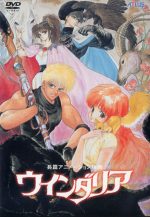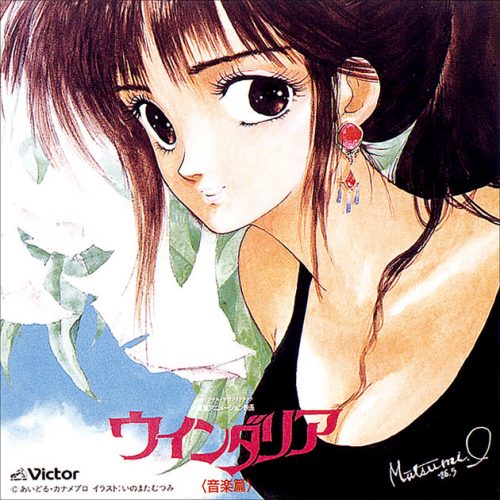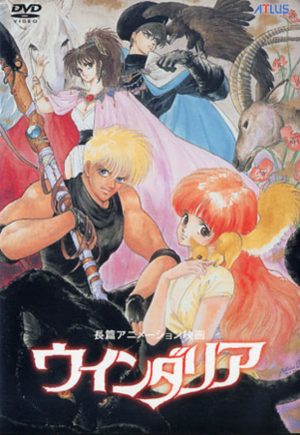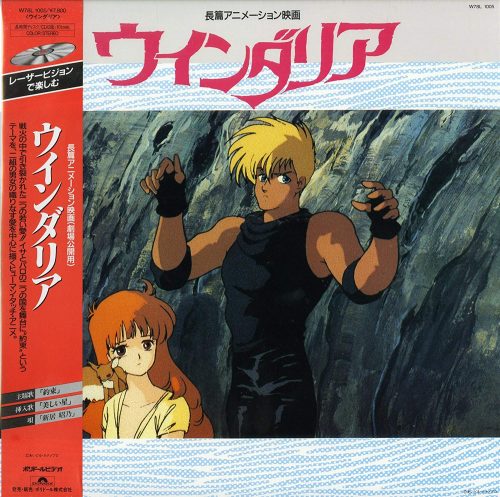

A Tragic Fantasy
- Episodes : 1 (feature film)
- Genre : Action, Drama, Fantasy, Romance, Sci-Fi
- Airing Date : July 19, 1986
- Producers : Studio Gallop
Windaria Introduction
Based on the novel by Keisuke Fujikawa (who also wrote the script for the movie), Windaria tells the story of two couples in this magical world with two kingdoms at war, Paro and Itha. One couple is Izu and Marin, just two regular farmers just trying to live their lives in a neutral village, and the other couple is Jill (the Prince of Paro) and Ahnas (the Princess of Itha). As the story progresses, their destinies start to intertwine with the fate of the world at hand.
What We Liked About Windaria
While the animation quality of its time isn’t near the level of lets say Akira or Macross: Do You Remember Love?, as a theatrical feature, it is still much higher than average. The designs may be a little generic in nature, but perfectly captures its unique atmosphere of fantasy mixed with steampunk. The original Japanese version just has this sense of emotion that you don’t see in any nation’s animated features or programs with its ending. However, dub does have its controversies, which we wish to share as we progress throughout this review.

1. Balanced Story With a Unique Message
Through this anime, you are getting a pretty balanced story with everything that’s going on in this war. As we shared in the synopsis, it focuses on two couples and how the conflict between the kingdoms affect them and their relationships. When you get to the ending, it is a pretty messed up one, but it isn’t about “with great power, there must always come great responsibility,” but there are instances where your good intentions will lead to disastrous consequences. A lot of people are going to have a bad impression of Izu, but he’s a country kid who doesn’t know any better, and he was reasonably easy to manipulate. He royally screws up thinking that he could provide for himself and his family. Through his actions, audiences can learn that sometimes that if an offer is too good to be true, then it is! If you take it, it could mean everything and everyone you love!
2. Amazing Soundtrack
In this anime, audiences are promised an appropriate soundtrack of orchestra, percussions and acoustics to reflect its atmosphere but it knows how to throw in an upbeat 1980s J-Pop song. This is most notably done with Akino Arai’s Yakusoku, meaning Promise. This is highlighted when Jill and Ahnas secretly meet in the forest. The upbeat instrumentals shows you the happiness they share together, but the lyrics also highlight their upcoming tragic end. Another song that Arai contributes to that perfectly compliments the tragic ending to Windaria is Utsukushii Hoshi, a Beautiful Star. The harp hook just says it all.
3. Excellent Voice Cast
The original Japanese version has a cast of big names from its time period who are still active to this day. Izu is played by Tooru Furuya, who you may know as Amuro from Gundam and Tuxedo Mask from Sailor Moon. Jill is played by Kazuhiko Inoue, most internationally famous as Kakashi from Naruto. The voice of Ahnas is provided by Naoko Matsui, the voice of Naomi in Death Note, Sonoko from Detective Conan, and Dorothy from Gundam Wing. As for the dub, the narrator happens to be Russell Johnson, most famous as the Professor in Gilligan’s Island.
[ad_middle class="mt40"]1. Underdeveloped World
A lot of the world of Windaria is rather vague but can easily just be written off for the fact that it’s fantasy. In one instance, there’s a part where people have to face their fears in the wild, and there’s a floating ship in the air that collects souls when people die. The movie does say what they are, but there’s really no elaboration beyond how they came to existence or any other details. If this was let’s say an OVA series, it could have done more to explain such unique features.
2. Controversial Dub
The dub, done by none other than Harmony Gold, has been a source of controversy. Carl Macek has previously shared that when he got the rights to Windaria, no one gave him any notes on what the movie was about so he just wrote his dub from scratch. He changed names, personalities, and cut out 10 minutes of the movie (notably some nudity and drug references) to make it kid friendly. The dub tries to make it more of a redemption story for Izu (who is renamed Alan, who helped rebuild the world after his royal screw up), who has more of an upbeat and optimistic personality as opposed to how casual he is in the Japanese version. Due to these circumstances, some can say that he shouldn’t be blamed, but considering how many don’t like what he did with Macross, he should still be crucified for making a dub with drastic changes.
Final Thoughts

The original Japanese version to Windaria is one of those distinguishing tragic anime titles that almost equates to Grave of the Fireflies. Izu may not be the most likable main character, but he’s still relatable in a he’s only young and doesn’t know better kind of sense. He can be the everyday Joe who lives day to day, but if the opportunity for something better came along, he wouldn’t hesitate to take it. At the end of the day, that decision unintentionally made him a pariah. But should Izu be seen as a bad guy for what he did? Is the dub right to slightly change his story to a redemption one? Or does the Japanese version do enough to convince us otherwise that Izu has atoned for his sins based on the beginning? If you have any thoughts on Windaria, please leave them in the comments!
[author author_id="010" author="" translator_id=""] [ad_bottom class="mt40"]
Add Comments